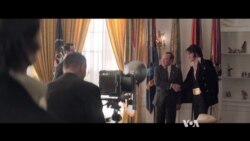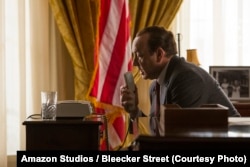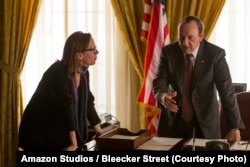It is undeniably one of the most famous images of the 20th century: Elvis Presley, “the King of Rock 'n' Roll,” shaking the hand of President Richard Nixon in the Oval Office of the White House.
Looking at the decked-out-in-gold rock star next to the conservative U.S. president makes us wonder: How did these two men get together?
The picture, part of a collection chronicling the unlikely Presley-Nixon meeting 46 years ago, has long been the most popular snapshot in the U.S. National Archives.
It is the one that most viewers choose to look at, ponder on and purchase copies of — as opposed to other timeless shots, such as the famous kiss between a sailor and a nurse at Times Square that celebrated the end of WWII, or astronaut Neil Armstrong planting the American flag on the moon.
Almost half a century later, the shot caught the eye and captured the imagination of filmmaker Liza Johnson, who re-created the bizarre encounter in her new insightful comedy, Elvis & Nixon.
"It is not a jokey comedy, but nevertheless, it is without question an absurd situation," she said. "You know, the coolest rock ‘n’ roll guy and, arguably, our least cool president that we've had — that their spheres would come together, there is just no way around the kind of absurdity around that."
Polar opposites
On a December morning in 1970, the King of Rock 'n' Roll flew to Washington, D.C., with his buddy Jerry Schilling, intending to meet the president of the United States. During the flight, Presley wrote a six-page letter explaining to Nixon that he wanted, for the sake of American youth, to help in the war against drugs. Presley was also very critical of the protests against the Vietnam War and a fierce enemy of communism.
Letter in hand, the King showed up at the northwest gate of the White House, requesting a secret meeting with the U.S. president. He would ask Nixon to deputize him as an undercover federal agent-at-large.
Filmmaker Johnson worked with Schilling to sort through the anecdotes of that day.
"Some of the more hostile accounts of this story would limit his motivation to being about the ability to travel freely with weapons and narcotics,” she said. “There may be some truth to that, but also, what I know from Jerry Schilling, these other motivations are also true."
Johnson explains that in the ‘70s, the wildly popular Presley was no longer part of the counterculture he represented in the ‘50s. In the ‘70s, he was part of the Establishment. He hated the Beatles and, as Johnson put it, he was uncomfortable with the changing cultural landscape of the country.
"I think in the film, everyone reasonably finds Elvis to be a bit delusional when he thinks he can go underground or go undercover. ... I think that, for me, what was most interesting was to think about what it meant for him," she said.
To re-create Presley, Johnson chose acclaimed actor Michael Shannon.
"I tried to make sure I did not get too caught up in the impersonation and that I devoted as much energy in contemplating what was going on inside of him as I did to try to seem like him on the outside," Shannon said.
Kevin Spacey offers an uncanny Nixon, fully inhabiting the grumpy president who comes to realize he has far more in common with the King of Rock 'n' Roll than he would ever have imagined.
"Elvis Presley was concerned about the protests against the Vietnam War, the lack of respect for law enforcement. He was a lot more conservative than a lot of people might have suspected," Spacey said.
Entertainment and politics
What makes the story so intriguing, Johnson says, is looking at it through the lens of popular culture 46 years ago, and realizing how uncommon it was to mix politics with entertainment.
After Presley hand-delivered the letter to Nixon's guards, White House staffers Egil "Bud" Krogh, played by Colin Hanks, and Dwight Chapin, interpreted by Evan Peters, convinced the president that a sit-down with Presley during an election year could generate good PR, but Nixon was in no mood to humor the legendary rocker.
"He [Nixon] didn't even understand why he should meet Elvis," the filmmaker said.
Undeterred, Schilling and Nixon's staffers regrouped to hatch a deal: Presley would sign a personal autograph for the president's daughter Julie in exchange for face time with Nixon.
"And for me," said Johnson, "sitting here in the present, to think about how much it has changed, the relationship between entertainment, culture and political culture, between then and now, it’s huge!"
Elvis & Nixon encapsulates that defining moment when the love affair between politicians and entertainers started in American history.

















